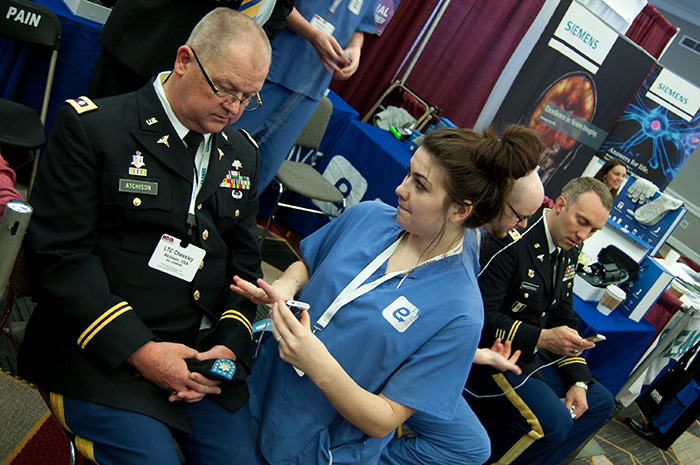Military Medical Research Conference Reminds Partners Why 'Business is Personal'

More than 250 military, academic and industry representatives gathered at the first-ever Medical Research, Development and Acquisition in Support of the Warfighter conference, co-hosted by the National Defense Industrial Association and the U.S. Army Medical Research and Materiel Command March 23-25 at the College Park Marriott Hotel & Conference Center in Hyattsville, Maryland.
The goal of the three-day networking event was to help organizations understand the structure of the USAMRMC, its current research priorities and potential collaboration opportunities. While there was a lot of talk about science, there was much more conversation about people and relationship-building. Leadership emphasized that partnering with the USAMRMC means understanding military medicine's "bottom line."
"The answer to 'why' is that we are here to protect them," said Dr. Kenneth Bertram, the USAMRMC's Principal Assistant for Acquisition, referencing a photograph on a 10-foot screen depicting a severely wounded Soldier surrounded by doctors and medics working to save his life on the back of an aircraft.
The title of the slide was, "the real bottom line."
"We are looking for partners to protect, heal and restore," said Bertram.
Former Army Surgeon General retired Lt. Gen. Eric Schoomaker provided a keynote address to the group and expanded on what he called the "deeply personal mission" of warrior and military family health care.
"This isn't just business to us," said Schoomaker.
One such example is Sgt. Brendan Marrocco, who lost both of his arms and legs in combat in 2009. Marrocco was the first Service Member during the war to survive a quadruple limb amputation. Four years later, Marrocco became the first Service Member to receive a double-arm transplant, performed at Johns Hopkins Hospital in Baltimore, Maryland, and funded by the USAMRMC's Armed Forces Institute of Regenerative Medicine.
Marrocco and similar stories were a reoccurring theme at the event, sparking a sense of accomplishment in the collaborations between military, academic and industry partners.
"We get indirect stories about Warfighters," said Carolyn Burke, a project manager for a small business that has been working with USAMRMC for several years. "But today we got to see more about who we are actually doing this for; that was significant for me on a personal level, and I think that is true for many others here too."
Echoing a statement made by other leaders, USAMRMC and Fort Detrick Commander Maj. Gen. Brian C. Lein said, "If we are not taking care of our veterans, no one will."
Working with MRMC Resources
 An official website of the United States government
An official website of the United States government
 ) or https:// means you've safely connected to the .mil website. Share sensitive information only on official, secure websites.
) or https:// means you've safely connected to the .mil website. Share sensitive information only on official, secure websites.



